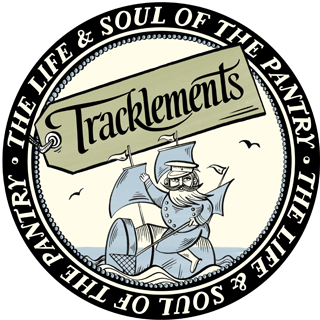

Tracklements

Wiltshire, United Kingdom
October 2021
Food products
Manufacturing
Australia,
Canada,
Ireland,
Netherlands The,
Norway,
United Kingdom,
United States
The Life and Soul of the Pantry In the green heart of Wiltshire, the only sound is the growing of fruit, harvesting of veg and creaking of shelves full of taste and innovation awards. Using nature’s larder, Tracklements carefully craft their range of the most unutterably delectable condiments. Proud to be part of Britain’s contribution to a worldwide revolution in food – with classic recipes that have been in their family for generations and their own “Tracklements take” on the boldest, zingiest flavours from all over the world. Their curiosity is boundless, their commitment total. Their mission is simple – to tantalise your taste buds. Their creed is plain – every dish, be it ever so humble, has a right to shine. That’s why they work with British farmers and growers from all over the globe who share their obsession for ingredients that are always natural, top quality and bursting with flavour - they don’t shy away from wonky either. Tracklements believes in business as a force for good, protecting the environment as they go. They’re committed to making the most planet-friendly condiments you can buy – using 100% renewable electricity throughout their operation, cleaning their own waste water, relishing recycling and sourcing sustainably – They’re gloriously green.
Overall B Impact Score
Governance 16.4
Governance evaluates a company's overall mission, engagement around its social/environmental impact, ethics, and transparency. This section also evaluates the ability of a company to protect their mission and formally consider stakeholders in decision making through their corporate structure (e.g. benefit corporation) or corporate governing documents.
What is this? A company with an Impact Business Model is intentionally designed to create a specific positive outcome for one of its stakeholders - such as workers, community, environment, or customers.
Workers 29.9
Workers evaluates a company’s contributions to its employees’ financial security, health & safety, wellness, career development, and engagement & satisfaction. In addition, this section recognizes business models designed to benefit workers, such as companies that are at least 40% owned by non-executive employees and those that have workforce development programs to support individuals with barriers to employment.
Community 18.4
Community evaluates a company’s engagement with and impact on the communities in which it operates, hires from, and sources from. Topics include diversity, equity & inclusion, economic impact, civic engagement, charitable giving, and supply chain management. In addition, this section recognizes business models that are designed to address specific community-oriented problems, such as poverty alleviation through fair trade sourcing or distribution via microenterprises, producer cooperative models, locally focused economic development, and formal charitable giving commitments.
Environment 21.9
Environment evaluates a company’s overall environmental management practices as well as its impact on the air, climate, water, land, and biodiversity. This includes the direct impact of a company’s operations and, when applicable its supply chain and distribution channels. This section also recognizes companies with environmentally innovative production processes and those that sell products or services that have a positive environmental impact. Some examples might include products and services that create renewable energy, reduce consumption or waste, conserve land or wildlife, provide less toxic alternatives to the market, or educate people about environmental problems.
Customers 4.4
Customers evaluates a company’s stewardship of its customers through the quality of its products and services, ethical marketing, data privacy and security, and feedback channels. In addition, this section recognizes products or services that are designed to address a particular social problem for or through its customers, such as health or educational products, arts & media products, serving underserved customers/clients, and services that improve the social impact of other businesses or organizations.